| Lista Light |  |
(NEW) April to August 2011
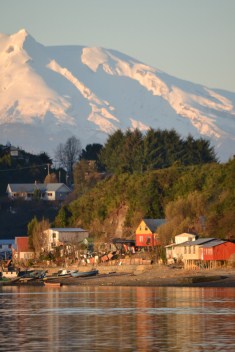
I had hoped to write this diary four months ago… brimming with autumnal joy on finding Chiloe and its bucolic inhabitants, but then a few mishaps, minor disasters, mass pilfering, depression and evacuation plundered the mix and the weeks unravelled into months. You are, thus, spared the gushing outpouring that would likely have manifested (although I will have to mention something of Chiloe, South America’s second largest island) as I write in cold-headed judgement, tethered aside a marina, in wood-smoked, tumble-down Puerto Montt.
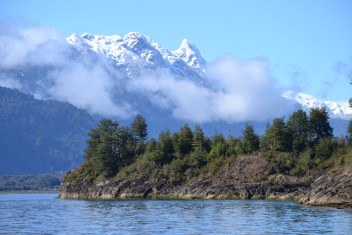
You see, we had meant to be tucked away by now, in a caleta. (inlet) somewhere in the wilds of southern Chile, in Her fabled lands of rugged mountains, moss-drenched woodlands and frosted grasslands. A land where Sir Joshua Slocomb dodged ‘savages’ as he sailed around the world in the late 1800s and where characters from Tolkien’s chapters I am sure wonder freely. In our quest for such an abode, we asked all poor souls whom we stumbled upon, in case they should know of the address, ‘We’re looking for somewhere wild, remote…with wifi’. Hmmm, yes, I’m not sure it’s altogether achievable.. We shall see.
We had been working with our friend, Natalia, in America on our Caribbean Seabird Atlas. Weeks had shoved their way into months as we all three scrutinised and edited figures and text, until we thought we were there, before a new round of editing surfaced.
Finally, we were ready to leave Puerto Montt, after over two months of residency. This time, however, Lista stuck her heels in. To be more correct, we managed to flood the engine with salt water and our steed finally spluttered and wheezed to a holt. Loaded with fresh produce for our new home in el campo (the countryside) we swapped sea lions and spiralling mountains for puzzling days bent over the engine. Then one day, treasure popped onto the computer screen in the form of the much coveted and temporarily misplaced term, ‘Paid work!’) Hearts soared at the prospect of earning our keep surveying seabirds back in our old stomping ground; the Caribbean, except it was not to the Eastern Caribbean that we were to fly, but Jamaica.
Whilst in Trinidad last year, we had contemplated in ever decreasing circles whether we should work on Lista Light in Venezuela as there were reputed to live fine shipwrights specialising in wooden boats. After weighing up a barrage of vastly opposing opinions, we finally decided that it might not be the safest place to ‘set upon’ Lista, with a slum teeming with guns at the boatyard entrance and rumours of boats being mysteriously impounded. During the process, we investigated statistics on the most dangerous countries in the world and sure enough we were happily ensconced amongst some of the winners, including: Trinidad, virtually every country in Central America, Venezuela and I’m pretty sure Jamaica didn’t miss a showing either. Hence, we were trotting off to another dodgy destination. Not that it didn’t involve an element of heart ache over the whole flying thing, after avoiding taking to the carbon guzzler in preference to our trusty wooden whale, but we just could not turn down this golden egg of an income, even if was only for a few weeks.
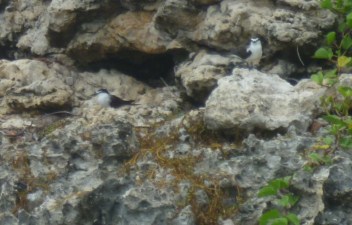
We found the tiniest yellow-warbler nest woven with crispy leaves, slivers of plastic and spun with spider webs. Bright marmalade coloured chicks threw open their gaping mouths as we peered at them, while their parents rustled in the bushes snatching flies and larvae to pop in.
For a couple of nights we camped on the cousin island, stalking out during the night to search for returning turtles heavy with eggs. Before we arrived, fresh marks and excavated sand marked their nests, but much to our disappointment, no ladies returned during our stay. We were visited by hoards of cockroaches which scuttled into all corners of our rucksacks, pots and sleeping bags and the most beautiful iridescent Jamaican mango (an endemic hummingbird) sipped nectar above our head. Brown pelicans crashed through the sky, plunged into the sea, to spring out of the water with a sack full of water and fish fry. Ranks of magnificent frigatebirds, blackly circled the island like awaiting jurors.
For the first couple of days we worked with Rik, a turtle and conservation biologist from Florida who did the turtle surveys and on his last evening we has a decent chat; wonderful. Conversation had become a rare and precious repast, after the last months in Chile with a dictionary perpetually glued to our noses. To be able to actually express ourselves was a huge relief. We had met some really wonderful Chileans but our Spanish abilities were so appalling that it was really only those who could speak English or who were used to dealing with ‘estranjeros’ (the unfortunate term for us gringos) and slowed the tempo to a three year old’s pace (on a good day) that finally this crazy language with its rrrrrrrrrrrrrs and els, ellas and endings could occasionally be deciphered.
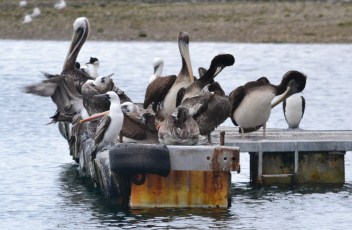
What we had not anticipated before pointing Lista’s bows to southern Chile was the accent that was to await us. Only now, after returning from Bolivia, can we fully appreciate the state of our folly. We have reliably been informed by several sources that it is the most difficult version of South American Spanish on the continent! That Columbian, probably followed by Peruvian and Bolivian Spanish are the most pure and decipherable to us Johny foreigners and that if one can master Chilean Spanish, one should be able to understand all others! Oh bitter joy. Meanwhile, we return to ‘beloved’ Puerto Montt to a cacophony of completely incomprehensible high speed questions void of, ‘Ss’ not only at the end and beginning of sentences but callously removed from the innards as well….aaaahgggh
Back on Jamaica, after establishing the addresses of each land and seabird on our posy of islands, we retired to the fabled Blue Mountains, a haunt I had conjured marvellous images of, after Emily a friend who lives on nearby Cayman, waxed lyrical of the misted tree pocketed hills. In fact, contrary to popular press, Emily adores Jamaica and after our short stay, so did we, ranking it as one of the finest islands that we have encountered in the Caribbean.
We had been given a driver for safe passage between the island surveys and the guest houses. Our colossal black Jamaican was a picture of meek dutifulness, always on time, seldom uttering a word, even with my repeated questioning. It was only when Rik had to call him, that a slightly earthier side of the dulcet goliath was revealed. He was as ever driving, but rather than hanging up after their conversation, he left the phone on, at which point, our wee, ‘goldilocks’ must have developed a disposition for road rage. With mobile vibrating from the pitch, he roared at some poor motorist at the top of his powerful lungs a string of expletives that would turn even the most proficient of ‘cusses’ green!
The fact that we could not really understand one another was another minor floor in the driver-ecologist relationship. This predicament was not, however, as bad as with our fishermen whom motored us to the islands and with whom I had not an iota of an idea as to what he was saying and he didn’t even speak Spanish. Then again, should a poor Chilean find herself in Glasgow, Newcastle, or deepest Devon I’m sure she would be delighted with the variety of British accents?
We did finally succeed in engaging our driver in conversation, with the subject soon straying to gang warfare on the streets of Kingstown. Recently the leader of all things drug and gun orientated had been extradited after pressure from the Obama administration. Our driver soon assured us that actually the man was a hero and a pillar of the community, ensuring children went to school, buying their uniforms, dissipating neighbourhood disputes and generally maintaining the community’s smooth functioning. It appeared that the majority of Jamaicans viewed him as a sort of ‘Miss Marple’ figure and would rather have kept him. At which point I asked, ‘Sorry, what was his name?’
‘Meeester Coke’….
‘Oh, I see…..!’
Once the survey work was completed we found a Bed and Breakfast in the Blue Mountains where we could write up the results. The landlady’s (Susan) brother, John picked us up from Kingstown in his clapped out Nissan and we slowly spiralled up and up into the sky. John was one of the happiest men I have ever met. He adores Jamaica, but particularly the Blue Mountains and most particularly his patch of the Blue Mountains where every day he tends his tomatoes, dasheen and plantains. Crystal clear water always flows through his valley, his extended family perch on its hillside; he is in heaven.
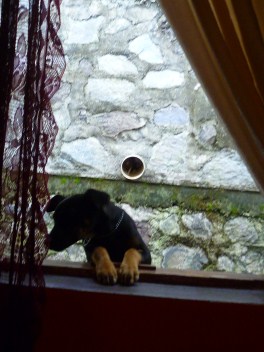
So we settled down to Jamaican family life, tapping on our laptops during the day and running in the late afternoon, scrambling higher and higher up the mountain’s hillsides. ‘Dashuan’, or ‘Da-bling’ as we christened him, emerged from bed sometime in the midmorning and asked us what we would like to eat and when and then told us what we would eat and when! With a flourish, sudsu/coocoo/mealiemeal (maize flour boiled) would arrive with an assortment of beautifully presented variously fried/curried/fricasseed chicken offerings. He was very cool and sang a lot. We were not cool and tapped… and we both laughed rather more at one another than with one another.
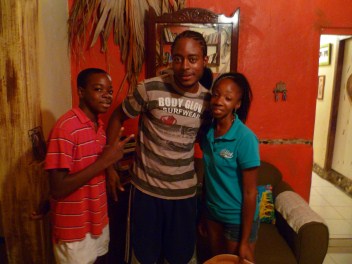
One afternoon I asked if I could take a photo of him, his brother and Susan and suddenly the relationship was transformed. He took photos of us working from his phone and lounged in the hammock by our side. I asked him whether he had travelled; he had been in a plane once, but didn’t enjoy it and would not go again and that he didn’t like water, so boats were out of the question, but most particularly he did not like the big toad that his sister had found in the garden.
We left the B&B one morning, walking up the track and watching the Jamaican red-billed streamer hummingbird guarding his red, flowering bush from potential rivals. (Hummingbirds love red and orange hues, indeed, a friend of Rik’s smothers ruby lipstick on his mouth at the start of the nesting season and hummingbirds flock to feed)! We hadn’t been altogether lucky hitching in Chile and weren’t positive of our chances in Jamaica, when to our relief a small black jeep came to a dusty halt. I moved an elegant posy of forget-me-not blue agapanthus picked from the road side off the front seat and as we snaked down the hill. I peered at our driver from the corner of my eye.
Deadly long red nails curved around the wheel; a slim ebony figure was wrapped in a turquoise silk Chinese embroidered dress; bare feet pushed the pedals, while flame red platform sandals were cast by their side; an orchid tattoos furled around her neck and a hallow of sassy, frizzy hair framed her striking face. We had scored, Anna was wicked. Her strong, deep voice boomed the most unusual sentiments; opinions we rarely found in others as we discussed law, HIV, teenage pregnancy, environment and her business. It was instant attraction for us all. I was determined to remember her and wanted a photo, but of course our Grace Jonesesk character would not concede and I limped away squirming like a spotty pink teenager.
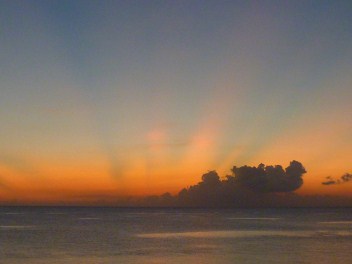
Next stop was Grand Cayman. Not my favourite place, exemplifying all those nasty worldly traits of consumption, environmental degradation and glitz; monopoly land in a great shining gold-studded bubble. We hadn’t seen Emily for ages, however, since she had lived with us aboard Lista Light when we arrived in the Caribbean and her frantic carrot juicing, stunning smoothies and jokes began to soften the cruise-shippers’ ‘paradise’. We also hatched a training programme to run a decent distant each day; first five, then six and soon fifteen miles were clocked off.
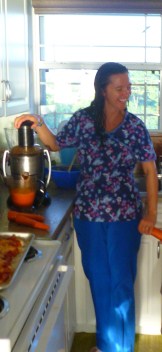
The reality of being herded through airports, the artificial world of Cayman and Miami, the barrage of cities, of buying prepared food, had transpired to render life rather depressing. It was, however, soon to become even bleaker. On arriving into the Arica bus terminal, northern Chile, after a thirty-thee hour bus journey from Santiago, a thief grabbed our bag….
We had been carrying out a ‘rubbish experiment’, to keep all our rubbish for ten months, to see what shape of a mountain we created. We had accumulated a hefty amount during our travels, especially as it transpired that most cafes, cheap restaurants, diners- food gaffs in general- no longer wash up and everything comes in smart little polystyrene boxes (later to gather in little pieces on the ocean currents) with plastic cutlery to decorate. OH JOY. We carried a container, knives, forks and cups (causing the flight hostess to raise an eyebrow) but we didn’t always remember to carry them or created dissent when asking not to have packaging.
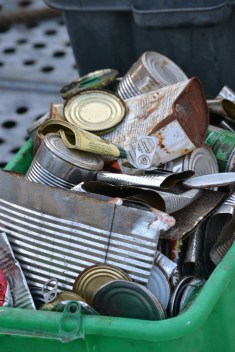
Needless to say, the thief did not take the rubbish bag (oh, I would love to have seen his face if he had) but the most precious bag, with Dave’s laptop and the new wiz-bang camera we had brought for our seabird work and all our Chilean and Jamaican photos (hence the lack of photos in this log…).
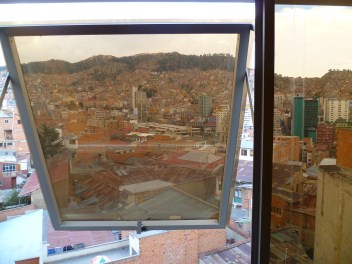
In misery we sat for the next eight hour bus journey to La Paz, Bolivia. The next days were full of bowler hatted ladies, with long black plaits joined at the end with a sort of curtain pulley devise. Gaudily striped cloth wrapped across their backs covering bulging clandestine items and rather than one skirt, they wore several! This all transpired to give the appearance of a rolly-polly Russian doll. We searched the streets for jungle gear, with clapped out cars and buses belching out clouds of noxious fumes and more bowler hatted woman pressing fresh oranges for glorious juices, or sitting under mounds of avocados, fake watches or perfumes. Street sellers abounded, candles in one area, plumbing pipes in another, it was just a matter of finding your desired item, not an easy task at 3700m with lungs bursting as we pounded up another vertiginous hill. What was clear, however, was that woman were the workers, whether steel mongers, butchers or road diggers, where exactly the men were and what they wore, will forever remain a mystery.
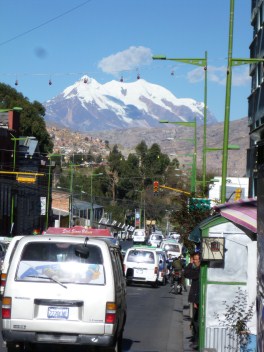
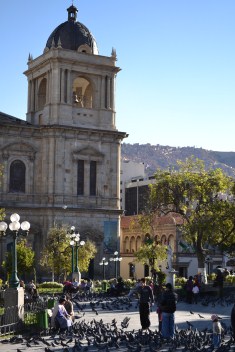
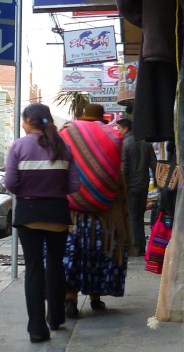
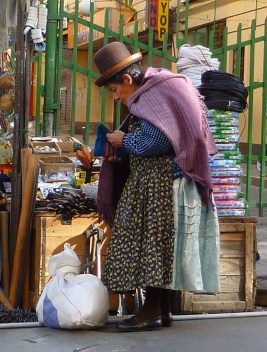
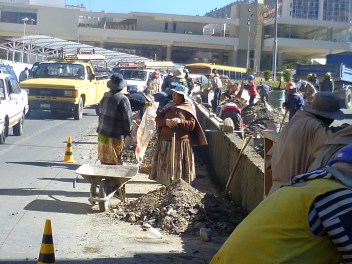
During the nasty buying session, in a city just like every other in the world, with flashing adverts and honking abuse, we found Isabel, while perched on a bucket and dining on chicken stew on a heap of rice. She is an avid high altitude climber. German by birth, she has lived in Argentina for ten years and scaled most of South American’s more tricky mountains. She keeps returning to Bolivia as it holds some of the greatest terrain.
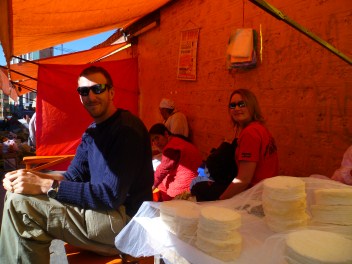
Exactly one year ago, she was climbing an icy mountain near to La Paz. Her companion suddenly fell, pulling her with him in a 400m decent. She broke her ankle and he severely damaged his skull. She remained on the glacier for two nights, crawling when she could during the day, drinking ice melt and propping her head up by night to prevent sleeping to her death. Her climbing partner died. On the third day a rescue party arrived and she was transported by mule off the mountain. Soon she was climbing again with crutches and when we met her she had made a first ascent up an icy Bolivian mountain. It was great to have a friend in the city and we moved to her labyrinthine hostel and sampled the delights of Bolivian street food together. (To read an article about her near-death climb follow this link:
http://espn.go.com/espnw/features-profiles/6787819/isabel-suppegrave-climb
We stood on the top of a car choked hill in La Paz looking in turn from ‘flota’ (clapped out bus) to colectivore (shared taxi) and back again. We were about to leave our altiplano home and head for the steaming recesses of the Bolivian Amazon jungle. We had been warned that the road is deemed to be one of the most dangerous in the world. Great.
As clouds of chocolate dust blacked out any sight lines and our taxi driver sped down the hillside at break neck speed, I was beginning to think that the bus might have been the better option. It was hideous. I closed my eyes and prayed. We were on a single track mud road and to our left the world stopped and began again hundreds of metres below, somewhere near to where the last passengers had fallen to their peril. The child in front kept winding down the window and we kept asking her to close it as our lungs filled with the grit and earth billowing over us. She did it again, but this time a stream of vomit protracted out. The driver was a moron, intent on passing everyone even though there was no room. After another, hideous, perilous move Dave boomed from the back seat, ‘No necessita conduciar como un niño..’ (there’s no need to drive like a child) or some other probably incomprehensible Spanish) but the roller costa ride never stopped.
Somehow we avoided death and were deposited into a town, Caranavi, in the dark and found a bus to transport us onwards for the night. I couldn’t close my window and a surprisingly icy draft lashed at my neck. I kept waking up sure we would miss our stop. I could just make out tall trees, concrete houses, dogs, corrugated roofs and tumbledown villages through the monochrome night, furling along the road. Nine hours later we were deposited on the side of the grit road as light gradually smeared across the sky. A school, houses, a café and a smattering of shops marked the village, El Palma.
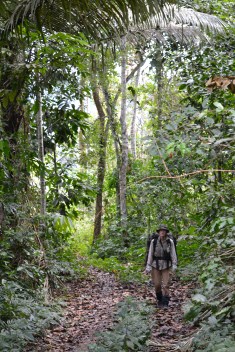
Soon we were heading for the Amazon, our first foray into this mighty rainforest for both of us and my dream wilderness. We clutched machetes. Our bags bulged with food: pasta, garlic, oil, peanut butter (heaven) flour, yeast and some carrots, as well as the MSR stove, hammocks, bird book and a handful of clothes. The fields, plantations and secondary woodland heaved with multi-coloured birds, dragonflies and butterflies; we were in our element. This was soon to change.
We were hacking our way through fairly dense secondary rainforest with the shadows growing longer and longer, hoping to find a hunter’s path. Miraculously it appeared and we decided to hang the hammocks before it became completely dark. We placed our ruck sacks in a bright orange survival bag, downed some pasta and headed for bed. It was only 7pm, but pitch dark. Thus ensued one of my worst ever nights. We have both walked in rainforests in Asia and the Caribbean etc., I have trekked and camped for a couple of days in Sumatra and Malaysia, but this was just not the same. We were on our own, in disturbed forest, close to a path along which animals and people hunted and I was becoming increasingly scared
It was all completely irrational, but it was stony black and the unfamiliar sounds emanating around us very soon morphed into those of jaguars, peccaries and warring tribes. The reality is that jaguars generally keep well clear of gun wielding humans and two bundles in the trees would not be associated with prey; peccaries would similarly ignore us hanging above them as they trundled past; and humans would not be out at night, as every other hunter is. This of course is all clear and logical in the wonderful, warm, light of day, but not at all relevant in my lonely hammock and I proceeded to become more and more petrified, hardly able to breath or move for fear of triggering an attack!
Then at about 2am it started raining and didn’t stop. Needless to say, we had not tied our hammocks particularly well and torrents of water began to gush into our beds. We hung freezing in a pool of water for fear of getting out and being snapped up by some passing hunter! Suddenly, I heard an almighty crack and Dave swearing. I looked through my green gauze and Dave was upside down scraping the floor!
I had been bursting for a wee for hours but couldn’t bear to face the world beyond my zip. Precipitated by Dave dangling upside down, we both gingerly put our feet on the forest floor. I looked down at my trainers with my head torch. Hundreds of glittering eyes stared back at me: armies of ants, spiders and every imaginable invertebrate crawled across the floor, while ants the size of puppies marched across our hammock strings. We hurriedly returned to our sacks and willed away the darkness, growing colder and colder in our wet hammocks.
We were both fairly keen to beat a hasty retreat home after this first disastrous night, but soon puckered up and headed onwards. As the days crept by, we developed a routine. Each day, at 4pm we began to search for a campsite; somewhere open was the most desirable, preferably near a river or stream. A triangle of trees was selected so that the feet end of the hammocks used the same support, so that we close. The space under the hammocks was slashed and a centre pole cut and lashed into place with climbers. A tarpaulin was hung over it to provide a roof and the two machetes planted near the hammock head ends, within rapid hand reach for the night time. Dave would miraculously start a fire, even with sodden rainforest wood, mustering his deep, growling, hunter-gatherer instincts. Then the pasta would be wheeled out, yet again.
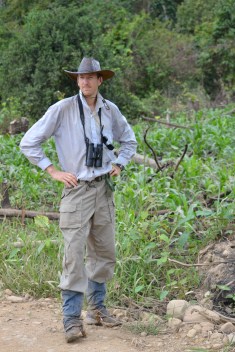
We stumbled across many temporary hunting camps, often with chilli bushes and if we were really lucky pawpaws and plantains which could be added to the ‘feast’. Porridge was the king of dishes, mixed with powdered milk, salt and occasionally, as a special treat, honey. Strict rationing prevented ‘over-indulging’ on porridge and the limited supply of petrel for the stove necessitated the cooking of a hefty batch of pasta on the evening’s fire. This was unfortunate, as the soggy gruel would perpetuate to breakfast and sometimes even lunch the following day. If pasta failed to make an appearance, however, we would suck a teaspoon of peanut butter and a boiled sweet.
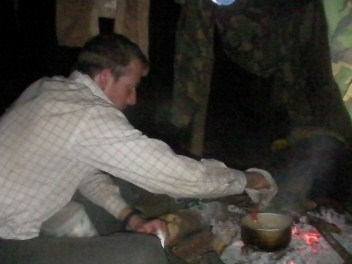

All who know us will realize that such behaviour is highly unusual. We are variously known as gannets and prime porkers, with very healthy appetites. It was an interesting experiment and oddly neither of us suffered from pangs of hunger. The repercussions of the diet were not altogether savoury however. Whenever either of us bent over or sat down and then regained our feet, we would dive into convulsing head rushes and just about pass out! The other product, or should I say lack of product, is perhaps desirable and exemplifies a reduction in wastage, with both of us not needing to ‘relieve’ ourselves for three whole days!
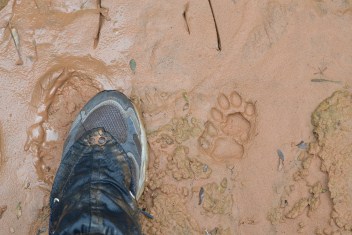
We searched for hunter’s paths heading west, following footprints and searching for old cuts in vegetation. We were aiming for a lake and a river and hoped to follow it north to Ruenbaki where we could find a bus back to La Paz. The topography of the forest varied as we scrambled 200ms over a series of hills and then down into the river terraces. The forest morphed from tall canopy, with little undergrowth; to low trees and scrub on the hills and what appeared to be mainly primary rainforest.
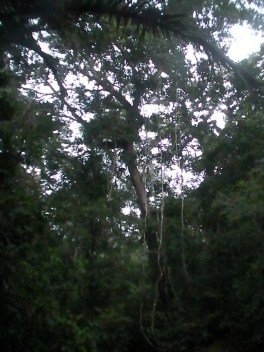
Metronomic clangs echoed through the trees as we swung our machetes, taking it in turn to clear the way. Our eyes constantly scanned the forest floor, in case a fer-de-lance or similarly venomous critter might be looking back. Yet in twelve days, we didn’t see a single snake, only one young, tiny snake brought dead to us by a village child and another that positively ‘flew’ through the undergrowth to avoid us, as we neared a community on our way home. We did see plenty of tracks of cats, jaguar, deer, peccaries and colossal tapias.
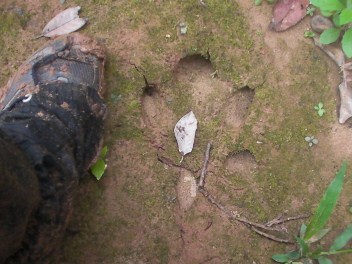
We were regularly joined by macaws squawking over the canopy, trogons swooping for insects, woodpeckers cackling, green oropendolas chattering or toucans yelping as the light faded from the sky. Mixed flocks of darting tanagers and other brightly coloured ‘ball-ball’ birds would dart by our sides with a rare glimpse in the binoculars blowing our minds away. We lingered longer on the penultimate morning, watching an Amazon kingfisher darting along the river, knowing that we would soon be leaving this haunting place. To our delight, at the fork in the river was a sun bittern one of our favourite birds, whom we became ‘acquainted’ with in the Orinoco. This fragile, slim wader is a fairy amongst birds and can only have evolved to become a ballerina. Even its call it’s a weak shimmering note barely uttered before retreating.
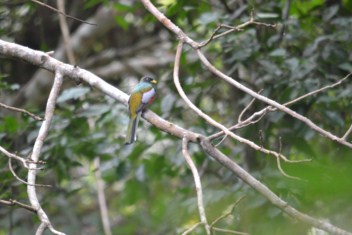
It was both of our first wilderness experiences. We have both walked and lived in remote places for days and months, but never alone and never quite like this. As the days passed and we walked deeper into the olive green world, we knew that if either of us were to become badly injured, we could not seek help. It was as if we were reverting to the Stone Age, or some ‘Jurassic Park’ reality, as darkness fell and a sliver of smoke curled through the sepia trees of our camp. It had become our longest period without adverts or news and the longest period without a mirror! It was incredibly simple and archaic. Each day, all that we needed was water, shelter, fire and our machetes to hack a path. Without our food stores, however, we would not have managed. As we walked our wonderful charismatic French friend, Pierre’s words pulsed through my head, ‘You will never die’.
Pierre had worked for the SAS equivalent in the mountains of France and also walked for two months in the Venezuelan rainforest. He was alluding to the fact, that there is always water, but he also said how very hungry we would get and that one of the main hazards to watch for would be the machete.
And he was right.
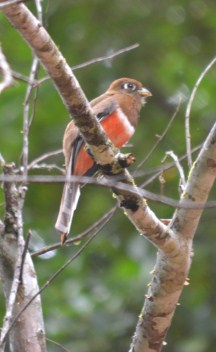
On about day six, we came to a fork in a path and wanted to investigate the lower direction. Dave decided to cut a stick to mark the decision point, as it was easy in the tangle of vegetation to lose one’s way. I watched him slash the branches off and with a flick the tip of his own finger. Blood gushed out, it was hideous. I sat him on my pack, the missing piece had gone and rain was quickly soaking him. I grabbed the first aid kit and bundled Dave under the tarpaulin. The rain complicated matters, but we eventually managed to dress it. We weren’t sure what to do next. We were concerned that if the finger should become infected, we should not be heading further away from civilisation and decided to find a camp as soon as possible and see how it was in the morning. As Dave stood up, however, his knees began to buckle and suddenly I was supporting him in my arms and as I lowered him back onto his bag he no longer responded to my calls, ‘Dave, Dave, Dave……’
After what seemed an interminable length of time, with my imagination leaping wildly, he came round. Apparently he had been in an immensely peaceful place with dulcet music washing over him. He had heard me calling, but didn’t want to leave…
Luckily, we had packed a couple of energy drink sachets and we whipped one out of the first aid. These are highly recommended in such circumstances and gave Dave a boost before he tried to get to his feet. We never found the other part of the finger, no doubt the ranks of assiduous ants found a good use for it. Unfortunately, the finger was the same finger that Dave had planed through in Trinidad and now there is not really so much left of it.
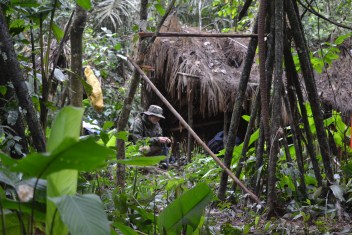
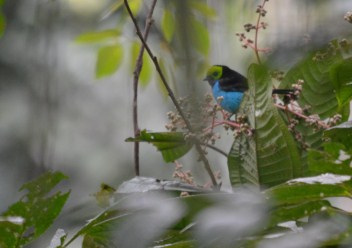
I adore rainforest, but on day five, as the evening grew near, I began to doubt the point of journeying day after day for years through the Amazon, a plan which we had been hatching. I was shocked by myself, but this raw environment was manifesting all manner of emotions to which we both had not previously felt. Dave in contrast, was relishing the honest, simple routine. The decision, however, was soon to be made for us. On arriving at the river we were met by villagers, the first people we had seen in six days. It was all rather shocking, but what was evident was the difficulty we would have in crossing countless large rivers and hacking paths close to them.
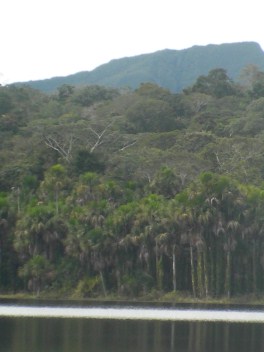
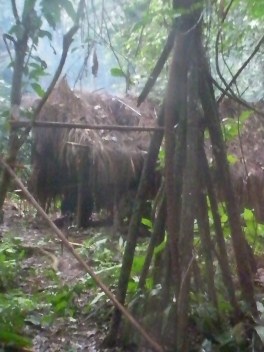
Of all the encounters we had during our rainforest odyssey, I think it was the leaf cutter ants that won both of our hearts. They forged highways through the forest; trembling, bustling, lines of determined workers, lugging ridiculously large weights upon their backs. Their trails were so impressive that they created new routes for other forest dwellers. On awakening after that first, dreadful, night, we found that the local brigade must have taken a shine to our orange survival bag, as lines of neat holes had been cut along its seam! In other meetings, we stumbled across armies marching up-side-down, clinging to branches with full loads or forming pink incisions through the forest as they waved their petals on our high.
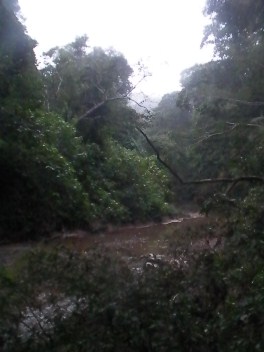
On preparing for ‘el jungle’ (pronounced ‘hoonglay’ in Spanish) we had anticipated mosquitoes, snakes, even hostile tribes, but there was one element of the natural environment we had not thought of. On the third night, in the hills, we finally clambered into our hammocks for another 12 hour stint, gradually tuning into the sounds that occupied that neck of the woods. It was a windy night and we were both expectantly cold. Leaves clattered from the canopy above our heads. Steadily we began to drift asleep. Suddenly a gigantic ‘SCREECH’ and almighty ‘CRACK’ pierced the night. Flung into searing consciousness, our senses tingled as our world appeared to tear up around us. It suddenly dawned on us, a tree was crashing down to earth, but would it crush us? We were pinned to our hammocks, cowering in the darkness..
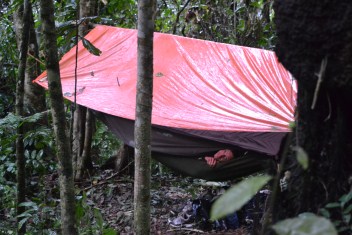
The next morning we peered out. A massive tree had fallen less than 50m from our hammocks, wrenching smaller trees with it and crushing all the vegetation below it. We had always scoffed at insane Health and Safety pro-formers warning teachers not to lead classes under trees. I mean, how utterly ridiculous, the likelihood of falling trees are pretty remote? Well not so in the rainforest! Gaps in canopy are really important to these habitats and a necessary feature of the ecosystem, allowing light to the floor and new plants to succeed. Falling branches can perform a similar function. The combined effect from the weight of bryophytes, climbers, vines and other aerial plants, with shallow soils, excessive rain and landslides, increase the likelihood of tree falls in tropical rainforests. Needless to say, this would still not stop me from teaching children under trees. Rather die under a tree, than under car? Future camp site selections did, however, involve some neck craning for trees with a lust for freedom!
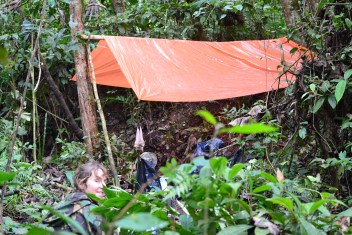
The only other slight discomfort from twelve days in glorious rainforest was our feet. My mother had ranted on numerous occasions about foot rot and I had scorned her concern. Of course, as mothers generally are, she was right. Even after relentless powdering and airing of paws and clean, dry (well almost) socks at night, we both succumbed. I suppose having all day, every day, wet feet is the perfect environment for fungi?
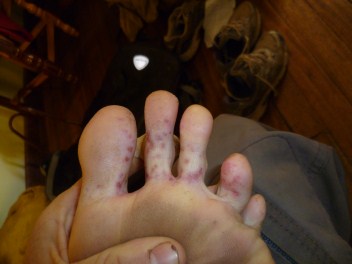
On the last night we couldn’t find any suitable trees. Aye, an odd predicament in a rainforest, we finally stumped on a motley cluster, close to the path that would lead to the village with the school that we had slept in on at the start of the expedition. We were, however, near to the banks of the final, large river that we would have to cross and so we walked down to its sandy terraces and feasted on the last of the rations- very garlicky pasta and chocolate semolina. Our bellies were popping as we watched skeins of screaming parrotlets, macaws and oropendolas flapping home to roost the sunset. The moon was massive and lit the way to the river where we scrubbed the pans.
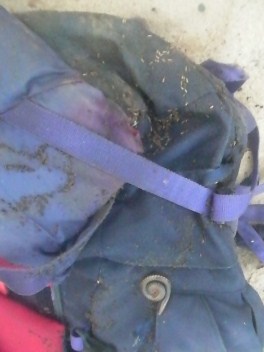
Our bedrooms were not such a pleasant experience! I was pinned against a tree which I knocked periodically through the night and which was also the local ant M25. We awoke to our wet day clothes, packs and hammock swarming in 30,000 termites, marvellous! We pulled everything to the river and after beating all our possessions free of the intruders and a fat millipede which had coiled into Dave’s rucksack, we cooked breakfast. Guzzling plump crumpets with the last of the honey, we watched an Amazon kingfisher perusing the river and then a gaggle of red and green macaws flew into a tree on the bank of the river, bliss.
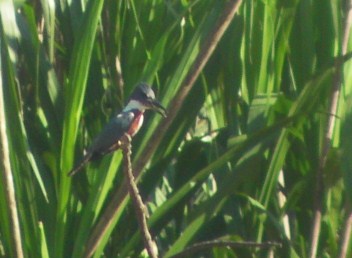
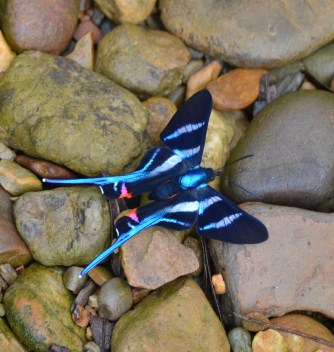
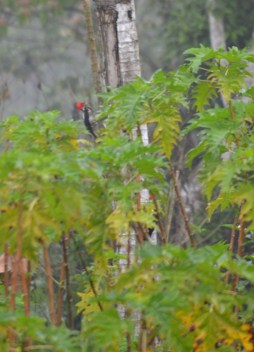
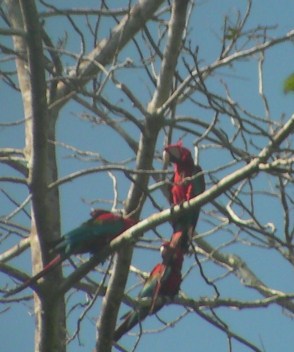
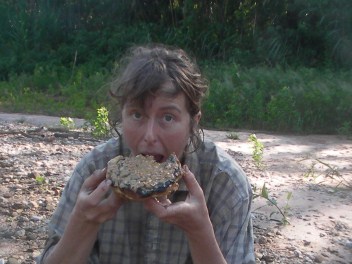
The rainforest experience was after all mild in comparison to the journey we would have to repeat back up the mountains to La Paz. Neither of us was looking forward to it. We walked for miles along sand tracks in the blistering heat, past grazing cattle and yellow-rumped caciques. Finally we slumped by the side of the road to await the bus, which would leave the jungle far behind. A group of children clustered around us and giggled at our Spanish, until a rattling orange cloud rising into the air, singled the arrival of the bus. Thus began the ascent.
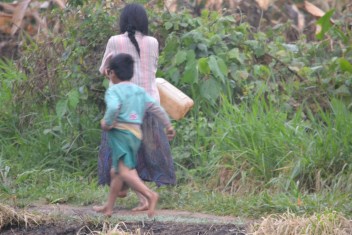
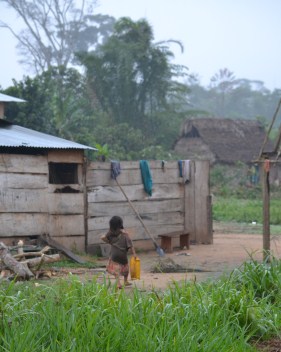
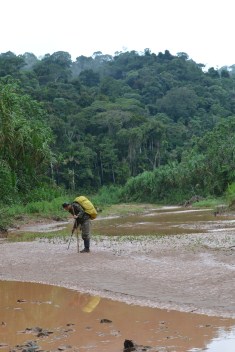
We stopped frequently for passengers, including a consignment of hardwood doors replete with massive, scuttling cockroaches and a thigh-high boy with a bucket of oranges. We sampled the road-side food, best of which were the bags of plantain crisps with treasure on the top in the form of a boiled egg in one bag and a salty, smelly hunk of cheese in the other. Orange peel littered the bus, leaving the young boy’s bucket empty and further citrus purchases necessary. Oranges and grapefruits had been a surprising crop of the rainforest. When nearing the village on the Rio Quequeba we had seen coils of citrus along the path. On arrival we found a grove of citrus bursting with mouth-watering, massive, fruits.
As the light faded we wound our way higher and higher up into the Andes. On the last journey we had travelled the final Andean descent in the dark, so this was the first time that we saw the view. My God. Incredible. Millions of hectares of rainforest swept in never-ending misty verdure beneath us. It was awe inspiring, representing one of The? last wilderness on earth.
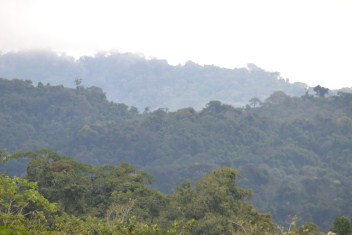
My eyelids soon grew heavy and I decided that firmly shut eyes were probably the best way of combatting the terrors of the ‘Death Road’. A couple of hours later, we heard a pop and soon everyone was out of the bus changing the tyre. A slick tyre, which had probably last seen tread twenty odd years ago, was replacing the relict, to join the other ‘skates’. We swallowed and piled back on board.
Dave was determined to stay awake in case this might afford us some safety, but finally a groggy sleep overcame him too. I don’t know how long we had been sleeping, when suddenly we heard an almighty, ‘Crunch!’ We were jolted awake with the rest of the shouting bus inhabitants. What now? Were we about to die? I looked out, pressed against Dave and my window was a massive boulder, overhanging the cliff. The man in front of us told us to leave our seats, in case it collapsed in upon us. Women were demanding that we should be let out and finally the door was opened and everyone piled out onto the moonlit road. It was 2am. The driver must have fallen asleep and swerved into the cliff, but what if he had swerved right? In the silver light of the moon, we walked across the road and gazed over the edge. Darkness and air, spiralling far beneath us…
As I am writing this and you are reading (well looking for the photos!) you know that we did of course survive and did not join the other deceased, forever resting and intertwined in climbers amid the skeletons of buses and cars at the bottom of that Andean precipice. Dave is indeed alive and well. His finger is still attached, if somewhat smaller and he is currently knocking holes into the wood burner to create an hot water heating system. When I married Dave, among all his rampant gifts, I did not know quite to the extent that Wallace (of Gromit) lurked within the Northumberland beast.
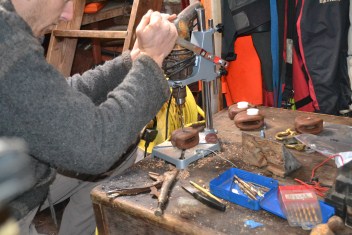
After three days of buses (Chile has an incredible bus network) staring out of the window for the first 30 hours at mile after mile of the driest desert on earth (The Atacama), we managed not to lose any of our possessions to any wayward Chileans. To my Devon-woodland sensibilities, the desert was pretty oppressive, just nothing, apart from rubbish glinting and flickering on its inhospitable surface. In some respects it is honest. Car tracks, down-hill biking runs and wanton fly tipping scar its surface. Unlike the proliferation of the tropics, vegetation does not conceal human ravishing. On returning to Puerto Montt, I was chatting to a lovely man in the marina and I mentioned the desert. A smile flickered across his dark face. He countered that every four to eight years that same acrid yellow landscape blooms with a kaleidoscope of colour. The sky finally opens and flowers besiege the Atacama.
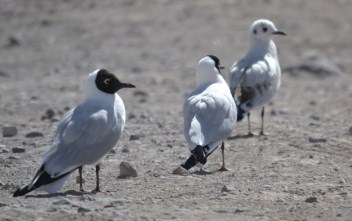
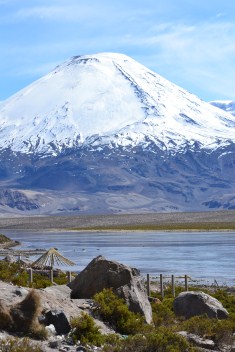
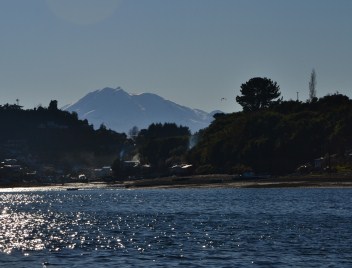
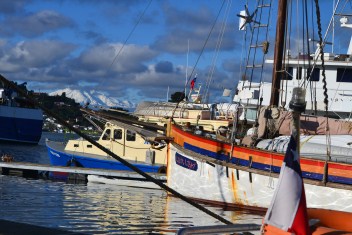
After seven whole weeks away, we raised our heads above the marina wall and both heaved a sigh of relief on finding Lista’s two masts still above water. But as we drew open the hatch to step down below, we were soon to discover that Lista had decided to provide us with a welcoming display. We gazed in horror at a landscape of green; every surface was covered in mould, from the wooden spoons, kettle and saucepans to all our clothes! Our eyes moved upwards to find a ceiling glittering in plump, droplets! Lista had turned into a grotto!
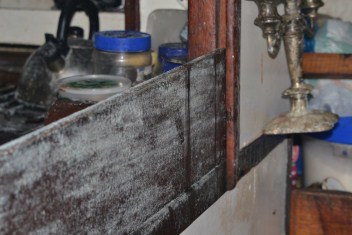
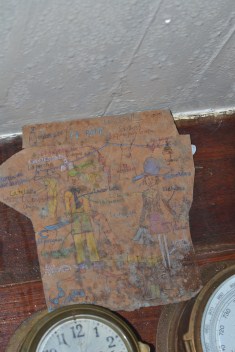
So here we lie in Puerto Montt, attempting to head south again. Chile has been our home since we arrived into Chiloe’s avian soup, in April. Unlike all other port entries we were overseen by a party of cormorants, steamer ducks and a Peruvian booby or two. This was due to our arriving into the altogether unlikely Chilean island of Isla Pascua (Easter Island or Hanga Roa) more Pacific in culture than Chilean. Although Chile mainland is hardly uniform, being such a very long thin country, it spans just about every climatic zone of the southern hemisphere, producing olives, grapes, citrus, plums and milk.
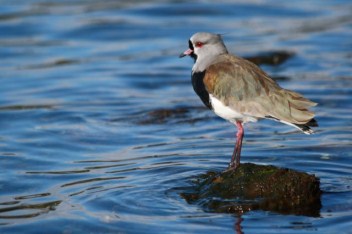
We did receive one unexpected visit from the Armada de Chile, who oversee all movements of boats within the country. We were tucked up in bed one icy night, when we were suddenly awoken by gruff voices. We both ran up on deck to find four short swarthy figures, in ankle length Russian grey coats, squished into a tiny dinghy. Their torches beamed a milky light in the mist. It was the oddest of apparitions, as they appeared to be floating in the air. They requested our position and destination, apologised for bothering us and were on their way! This is the law in Chile, for all who sail its waters; all movements must be reported. We stumbled back to bed, awaking in the morning to the distinct feeling that it had all been a dream.
For two weeks we sat in a deserted bay in Chiloe, with the saministas chugging past each morning to check the salmon pens and inhaled our first autumn in four years! We burst onto the lanes on our bikes, speeding towards Ancud, northern Chiloe and its principle city, in search of provisions. Austral parakeets screamed above our heads, two men stood by their yoked oxen adjusting his load, woodland made way for fields, fencing sprouted, tendrils of lichen spooled off wire and tiny corrugated iron houses puffed wood smoke. We were in heaven. It was as if we had landed in Devon, but one hundred years earlier. Bandurras (black-faced ibis) probed the grassland, wildflowers swayed in the breeze, fat filthy pigs snouted, orchards hung with ripe apples and seaweed dried on racks. There weren’t hedgerows exactly, more pockets of grassland amongst woodland, browsed by docile Ayreshire-looking cows, swinging their ample udders!
Four hours later and we had pedalled up and down every pot-holed, bone-shattering track in sight, but were still a good four hours away from Ancud and there was no way we would get there and back before midnight! On arriving at a metalled road we decided to turn the opposite direction from Ancud, in pursuit of an empanada sign. We cycled up a farm track and found a farmer to practice our Spanish on and his agri-tourism venture. He muttered that his wife was away and our heart’s sank as he shook his head at our empanada request. To our delight, however, he soon returned with hunks of cheese sandwiched between doorsteps of fresh bread. We bought apples, more cheese and homemade plum (the best), rhubarb and apple jam and were off in search of the village shop which he gestured with a flick of his hand to be, ‘up that way.’
An hour later and numerous hand flicks later, we had still not found the village shop. Even a lady whom clearly had hundreds of hens and most definitely eggs refused us a sale. It was growing dark and our chances of finding the fabled village shop appeared more and more remote. I spoke to a couple of grinning men parked at the corner of the road. They gestured down the hill. Completely phased and believing that the entire island of Chiloe was sending us on a merry goose trail, we skulked towards a farmhouse requesting butter and potatoes. Oh joy, a be-aproned woman somewhere in her late forties appeared to nod and we apprehensively followed her flailing hand into the kitchen.
A rather odd scene greeted us. A massive, fifties log burner stood in the middle of the kitchen with pots puffing upon it. Tomatoes were heaped in containers around the room and the old father sat at the kitchen table beaming. Blaring from the end of the room was a huge TV with prancing Señoritas in fishnet stockings, frilly tutus and nothing much else… Oh the rural idyll! The knee-high mother (have you seen ‘Les Triplettes de Belleville’ a wonderful French cartoon- well this was the grandmother!) beckoned me into the next brown room and grinned at piles of cheese sitting in the bookcase. I had decline as we had just bought our own Chiloen cheese and returned to the kitchen to commence the oddest supermarket experience. We finally left with potatoes, tomatoes, lamb/beef (we would find out later), eggs and butter (not home churned, but supermarket!). As we packed our saddle bags I noticed yellow, red and blue flags billowing above the farmhouse wall. It suddenly dawned upon me, the village shops were in fact the farmhouses! Farmers sold their produce direct to one another and the flags that we had passed along the way were signing that dairy/vegetables or meat were on sale!
As we rode up and down dale, eyes straining through the gloom, we heard the oddest croaking from a line of trees on the side of the road. I was sure that toads were serenading their ladies from the creek down below, but the chorus appeared to be resonating form the canopy of the trees? We pushed through the undergrowth and finally found the songsters, Neotropical cormorants- all black cormorants grunting like pigs! Chile was proving to provide all manner of surprises!
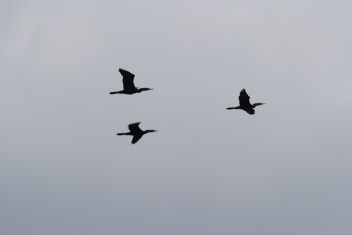
During those first blue high pressure days, we couldn’t understand why everyone wouldn’t want to live in Chiloe, it was utterly stunning. We cycled the tracks, eventually reaching Ancud to gather boat stores. Along the way, we stopped at an old wooden farm (wood being the vernacular building material of southern Chile) gazing at a tit-tyrant (similar to our blue-tits in size) plucking insects from the top of the apple trees. A farmer appeared and beckoned us into his orchard gesturing at the wind falls and offering us to fill our boots! We asked whether we could buy some milk from him. He walked away, leaving us wondering whether we had offended him, but returned with a ladle and empty plastic bottle. He strolled across the road, poured the morning’s milk from the churns that were awaiting collection into our bottle and sent us on our way. Our first real milk in over two years, bliss!
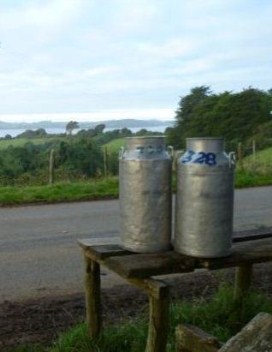
Of course, just like fair Scotland, there is a reason that everyone does not flock to live in Chiloe or southern Chile and for that you must ask Gill, Dave’s school friend. Gill arrived with her two girlfriends, Sarah and Nicola, for a week of Puerto Montt-Chiloe’s finest weather: wall to wall, grizzly-grey-constant-rain and chilling-to-the-bone! Such weather is conducive to staying inside, so in true packman style we ate and ate, baking bread, oatcakes, stews and soups until the lot of us could barely roll down the hill from the moor above the marina!
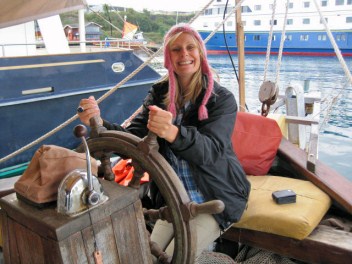
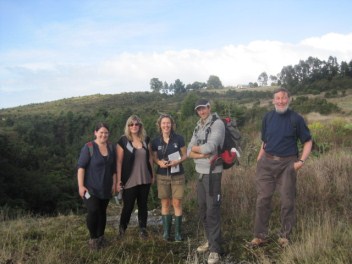
On the voyage to Puerto Montt form Chiloe, we realized, far too late, that we had left a vital part of our life behind, the bikes! We had tethered them together above the cove near Lista’s anchorage so we didn’t have to ship them back and forward on the kayak every day. In a couple of days, my birthday dawned and we decided to catch a bus to Ancud, hitch to the bikes and cycle home. Living in a freezer also necessitated decisive action, so on arriving in Ancud we decided to search for a wood-burning stove as well. A likely candidate caught our eye, but we decided to rescue the bikes first and we walked out of Ancud to find a lift.
Cars passed us, but they either waved ahead, suggesting they were about to turn off very soon (and didn’t) or slammed their foot on the exhilarator leaving us in a soup of grit! I had thought it would be easy in the countryside to hitch, but apparently not. Finally a pickup stopped and elated we piled in, only to be dropped three miles down the road, with another seventeen to go! We sat despondent by the side of the road with rain pouring down our backs. Suddenly we heard the rumble of a bus, the first in hours, but it was driving the wrong way, back to Ancud! Dismally we thumbed it to stop and arrived back into Ancud four hours later, having achieved precisely nothing.
Starving, we grabbed some food and ran to the bus station for the single bus of the day about to leave for the little settlement at the top of the hill (Faroe Corona) above the cove where we had left our bikes. We piled in with all the toothless country inhabitants and their sacks full of wheat and buckets of matter. The charabanc rattled off crunching over pot holes and depositing people at unidentifiable abodes, no doubt nestling somewhere in the woods beyond. We asked whether we could catch the bus on its return from the last stop a couple of miles away, as the bike ride home would take us forever. As we walked up the hill and down the other side, I joked to Dave,
‘Imagine if the bikes aren’t there?!’
As we rounded the corner, we looked in disbelief at a vacant cove, void of bikes. Oh streuth, we couldn’t believe it, such a sleepy country corner, it couldn’t be true? We ran to the local cottager, but her answer was indecipherable and the shaking of her head did not look positive. We hailed a passing car, but the stocky brute in the passenger seat looked like he would eat bikes for breakfast, rather than keep a cosy eye on them. The lady from the cottage appeared motioning about the bus. The next bus would not arrive until tomorrow afternoon, leaving us nestling in the freezing beach.
We ran back up the hill, wheezing in heavy coats. Dave screamed off in front as I pelted down the other side. Just as I reached him, I heard the throb of the bus’ engine. We have now had two thieving incidents in Chile, the first in over three years away from home. This Chiloen was idiotic on our part, but the other was callus. After speaking to Chileans it appears that this is highly usual, that everyone thieves from one another, well perhaps a slight over exaggeration, but there is certainly a problem. It’s such a shame and quite unexpected, as the Chileans themselves are in the main very decent, kind, people.
After a pretty dismal day and a failed birthday, we returned back on the bus to Ancud and decided that we should buy the log burner and at least achieve something from the day. The only question was how on earth we were to transport the solid iron critter back to Lista. The lovely ferreteria (hardware store) sales lady came to our rescue, producing two delivery men whom shipped us and our stove to the bus station, where we man-handled it to a bench. We weren’t sure how the bus company would view the stove, but we needn’t have worried as it was merrily pushed into the buses belly along with all the other passengers’ odd Ancud purchases.
The same problem arose back in Monty. We heaved the stove to the side of the road, but before we had to time to ask, a lotto seller was hailing a taxi for us and we were on our way to Angelmo. The taxi deposited us by the seawall and we gazed into a black hole, searching for Lista, it was now 10pm and was raining. We pulled and pushed and deposited it by the water’s edge. Now the trickiest manoeuvre of the whole escapade; the kayak trip. Dave paddled the kayak over and I waited in the mud with our precious acquisition. We planted it between us and tied it to the kayak, so if took a jolt for freedom, we would have a better chance of finding it.
I sat bolt upright at the front of the kayak, shaking in my attempt not to destabilise the cargo. We both jerkily paddled forward, aiming for somewhere in the middle of the blackness that engulfed us, hoping that we wouldn’t meet any boats and that Lista might eventually emerge from the night. Finally she appeared and we contemplated the ultimate hideous manoeuvre; how to deposit the woodburner and ourselves aboard Lista, looming some 1.5m above us, without us all ending upside down in the cold, oily water. I managed to extricate myself first and with a powerful lunge, Dave and the wretched stove landed in an exhausted heap on the deck!
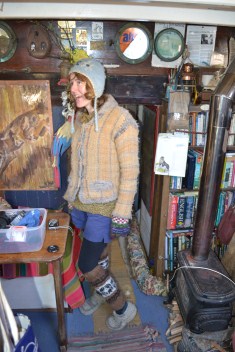
One day whilst tapping on the computer in ‘Woodburner Corner’, in the usual full regalia of fingerless gloves, woolly hat and several jumpers, I heard a voice from outside. We peered out to find a pair of lycra-clad men in a rowing boat. In a couple of breaths they had invited themselves and their wine aboard. This was to repeat itself throughout our stay in Puerto Montt, as Jose, el jefe (boss) of the local rowing club and Hernan, joined us for evening meals. Jose was by far the king of communication, possessing the superior language skills and gleefully translated every single word that Hernan, Dave or I uttered, turning the event into a sort of game show. If this didn’t work, the conversation would nose dive into slapstick humour as the most transferable tender. After a meal aboard Lista Light, we would all crawl home/to bed shattered form the strains of trying to understand one another.
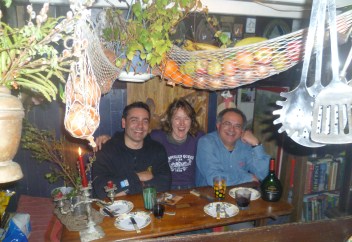
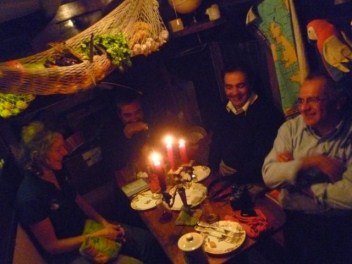
Within weeks Jose has spotted Dave’s natural rowing physic and the Thoroughbred was invited to represent Puerto Mont in the championships against Valdivia. Jose has gleaned that Dave had represented the great (?) Sheffield University in rowing competitions, but he appeared oblivious or failed to understand Dave’s protestations, that he had only rowed a couple of times for Sheffield and that their boats were very old and wooden and that the whole experience had not altogether been a success. Ever the optimist, Jose, Hernan and Gustavo (all typical broad, 5 foot nothing, Chileans) thought it time for a practice and so Dave, 6ft 2 willowy Northumberland joined them……
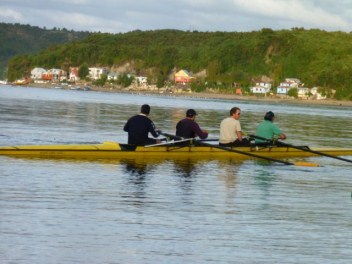
Before Dave became too comfortable at the oar, the race day beckoned and we jumped from toe to toe shivering at the rowing club gates in the icy morning breeze. Our chariot soon farted into eyesight, well actually was pushed down the drive and the wretched battle bus was loaded with a pyramid of three 10m rowing boats. Dave, Jose, three others and I squished in (once it had reached the top of the hill) and we began the jarring four hour journey north. Valdivia was not bad for a city, with a huge river furling through its centre. I found the University’s stunning botanical gardens and Dave, Jose, Hernan and co. finally reached the starting line. As they sprinted off, Dave looked back to check the opposition, but could only see a blur of oars disappearing into the distance as the real 21 year old thoroughbreds disappeared, leaving the Puerto Montt veterans to limp home!
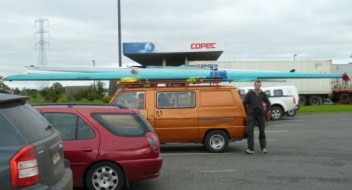
Chile definitely attracts interesting people, within weeks of hooking up to the marina we had met Mani (our wonderful Fin) Charlie (American-Mexican ocean wonderer) the ‘Seals’ who have made the tip of Chile and the Antarctic their home and the marvellous Frenchies, Pierre and Leo. Pierre sent us into stiches with his stories delivered in his husky French accent and it is just such a shame that living on a boat means that now he has floated far way to somewhere deep in the Pacific.
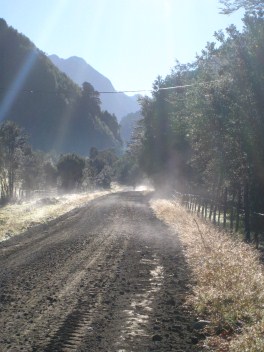
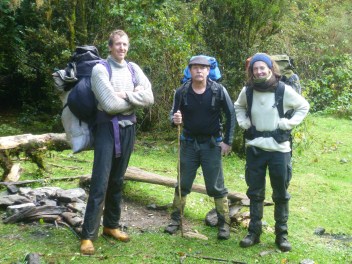
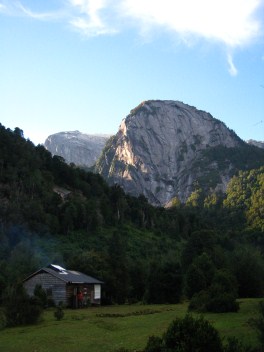
One day Charlie decided to take May, his Norwegian friend, Dave and I to Cochamo, a valley in the Lake District which ascends into thick Chilean temperate rainforest. We crunched through frosted grass and crossed braided rivers on bridges made from fallen trees, finally arriving into the campsite field. It was like an amphitheatre, framed by towering Andean mountains, dotted with fiery southern beeches heralding autumn, with southern caracaras thermalling above.
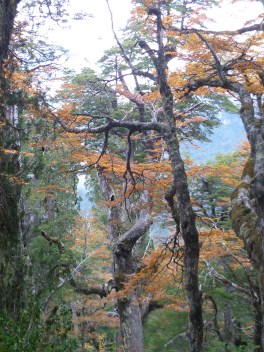
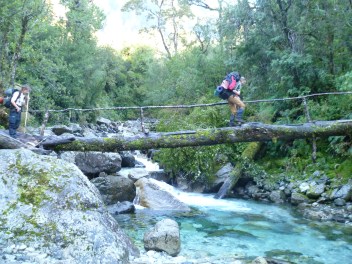
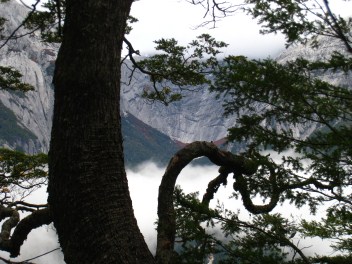
The forests were cloaked in lichens and mosses, with mighty alerce soaring into the sky. These are the grandfathers of Chilean forests; conifer trees that can live for over 4, 000 years. They are also highly desired for their wood. Their bark breaks off into perfect, sleek leaves, like slate and is traditionally used as shingles on roofs and also as overlapping waterproofing on the sides of building. They are mighty trees, but have been over-harvested. Now as with many tree species, the Chilean government has banned their felling, only dead trees can be harvested. Unfortunately, this regulation has led to people ring-barking trees, to ensure that the alerce die and can be harvested.
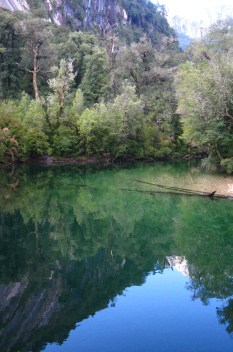
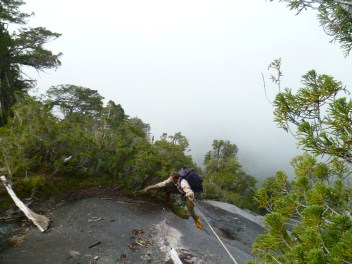
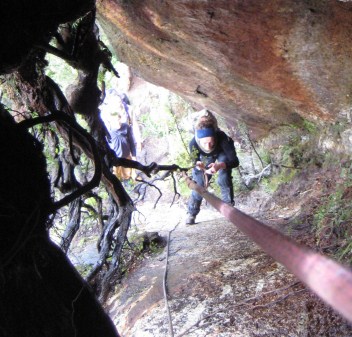
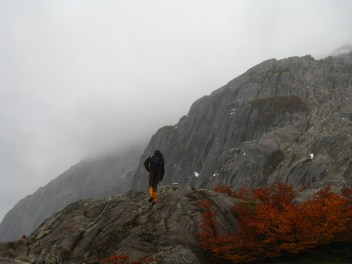
We spent four days in the Cochamo valley. It was the most beautiful place we had seen in Chile. One morning Dave and I skulked in a thicket in the hope of finding Chile’s national bird, the chucao tapculo and its relative the black-throated huet huet. They both sound like their names, which should have made things easier, but they also both have a habit of skulking, like the pursuers in the very dark recesses of thickets.
Suddenly we heard the huet huet and Dave replied. Incredibly it appeared fascinated by the lanky interloper at its front door and responded gradually hopping closer. From between the scratchy foliage a beautiful slate and fire coloured over-sized robin peeped. Then an explosion from a thicket at our ankles signalled the chucao. He dashed into the open for an instance, only to charge into the dark recesses of a bush. Returning to the campsite, a cow and calf had moved in and so had a chucao, right by our tent!
That night, another visitor arrived. Returning to our tent, a fat sandy mouse flew through the air in a panic. We eventually showed him the door and he skittered off. The same mouse, or one of his relatives, clearly had fun with our food supplies in the cooking hut during the night. When we all sifted through our food the next morning, we found that the mice had gleefully nibbled the sugar, pasta, honey and herbs, tasting the merest of samples from each!
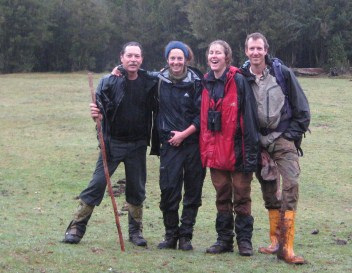
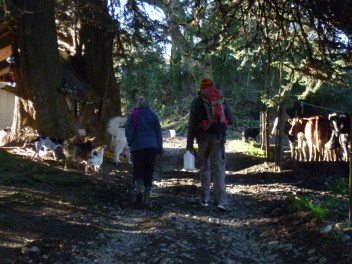
If you have got anywhere near the end of this never-ending tale then you deserve a stiff brandy. I had wanted to mention the stray dogs that in turn haunt and ravish the cities of Chile; a weird tramp underworld, with leaders and gangs pursuing literally the ‘underdogs’; the lowest of matted-haired shenzies. Of the drunkards being savaged to death by these feral packs, under the chill Puerto Montt stars. But I have run out of time. Then there are the wonderful Von Meyers, our Chilean- German farmers with whom we buy sumptuous unpasteurised milk and adore. There is the oddest Chilean customs of kissing, virtually everyone you meet, leading to my having to kiss ten young spotty rowing boys. I ask you! I do my best to hide now, but never appear to succeed in dodging the squelchy embrace. There is the food; sliced glow-in-the-dark bread, stuck together with spam and yellow cheese pages, sloshed down with Nestcafe coffee for breakfast and lunch. There was to be the comparison between April at home and in Chiloe: the snow drifts of the Cheviots with piping curlews, humping toads, wheatears and stoats, but the bell has tolled and I must leave you to finish your snoring. Meanwhile, we will climb into bed, four hours behind you in multiple woollen layers, with a hot milk and dream of England and Chile…….
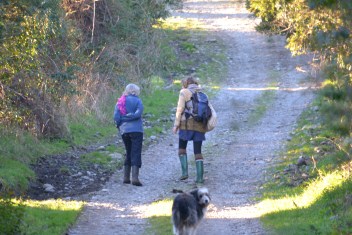
Back to previous section - February to March 2011
This page hit Count : 17515
This is the Lista Light Website, for the travels of the sailing boat Lista Light
Click here for text-version of site